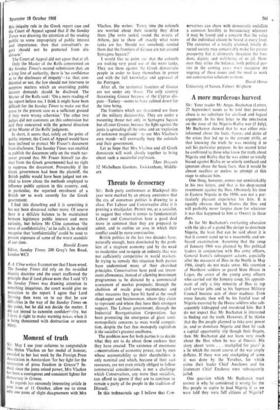Threats to democracy
Sir: Both party conferences at Blackpool this year were marked by an uneasy awareness that the era of consensus politics is drawing to a close. For Labour and Conservative alike it is proving a straitjacket. Permit me, as a socialist, to suggest that when it comes to fundamentals Labour and Conservatives have a good deal more in common than they are prepared to admit, and to outline an area in which their conflict could be more constructive.
British politics in the last two decades have, naturally enough, been dominated by the prob- lem of a stagnant economy and by the need to modernise and re-equip an industry that was not sufficiently competitive in world markets. In trying to remedy this situation both parties have undermined many of their cherished principles. Conservatives have paid out invest- ment allowances, instead of allowing investment programmes to be dictated by a commercial assessment of market prospects; through the abolition of resale price maintenance and other measures they have hit hard at the small shopkeeper and businessman, whom they claim to represent and where they have their strongest support. The Labour government, through the Industrial Reorganisation Corporation, has been promoting the emergence of giant semi- monopolistic concerns to meet world competi- tion, despite the fact that monopoly capitalism is the socialist's greatest anathema.
The problem now for both parties is to decide what they are to do about these cuckoos that they have created. The existence of enormous concentrations of economic power, run by men whose accountability to their shareholders is only nominal and which, because of their vast resources, are not even strictly obliged to follow commercial considerations, is not a challenge which Conservatives, any more than socialists, can afford to ignore if they are to continue to remain a party of the people in the tradition of Disraeli.
In this technocratic age I believe that Con-
ervatives can share with democratic socialists a common hostility to bureaucracy wherever it may be found and a concern that the voice of the individual citizen be heard at every level. The existence of a totally planned, totally di- rected society may conceivably make for greater prosperity but it ultimately threatens the free- dom, dignity and well-being of us all. How- ever they strike the balance, both political par- ties in the coming years must recognise the urgency of these issues and the need to work out constructive solutions to them.






































 Previous page
Previous page